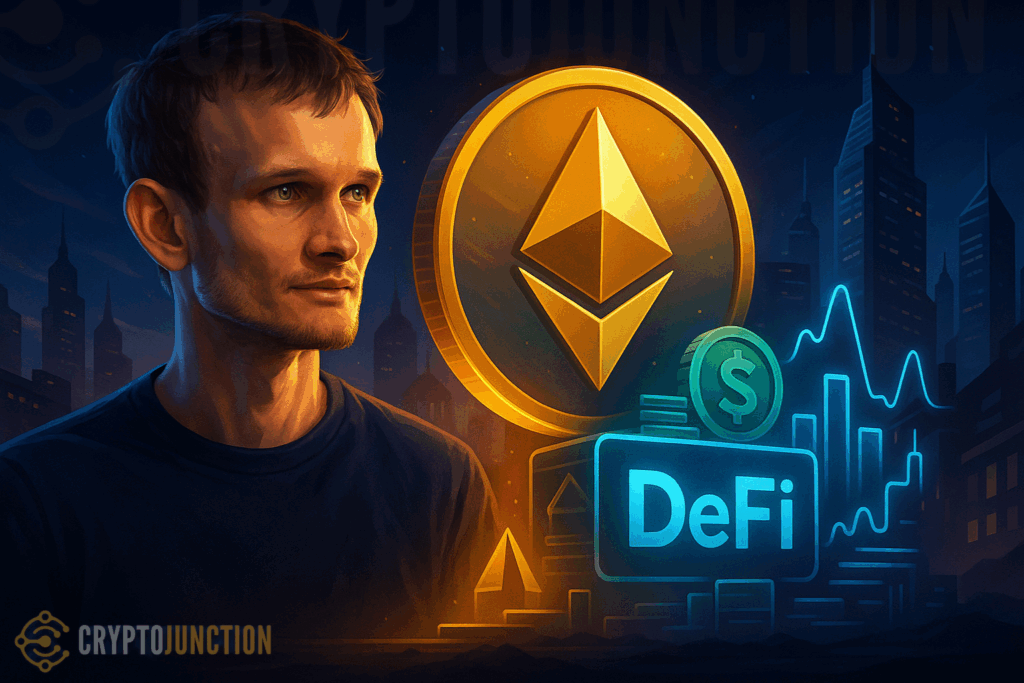What if the future of Ethereum doesn’t come from the flashiest NFTs, wild memecoin rallies, or speculative trading frenzies? It might come from something far quieter, steadier, and shockingly simple. Vitalik Buterin, Ethereum’s visionary co-founder, has made a claim that sent ripples through the crypto world: low-risk DeFi could become to Ethereum what search became to Google. Just like Google’s rise, this twist could reshape everything we know about blockchain’s future.
The Tension Inside Ethereum’s Soul
Ethereum has always been more than just a blockchain; it’s a cultural experiment, a movement, a rebellion against the old guard of finance. But here’s the problem: the projects that best represent Ethereum’s values think nonfinancial apps and community-driven initiatives rarely bring in enough revenue. Open-source experiments often fail to sustain the network. Instead, the heavy hitters have been volatile markets: NFTs, memecoins, and trading platforms within Ethereum DeFi.
Vitalik admits this split has created “dissonance” inside the Ethereum community. On one side, the idealists want apps that empower people. On the other hand, the network still needs steady revenue to survive long term. His solution? Low-risk DeFi protocols that generate reliable income without betraying Ethereum’s ethics.
The Google Twist Nobody Saw Coming
Here’s where the comparison gets fascinating. Google is more than just search; it builds browsers, phones, AI models, and countless tools. Yet most of its fortune comes from one thing: advertising powered by search. Vitalik suggests Ethereum could follow a similar path, particularly through its DeFi offerings on the Ethereum blockchain. Not everything needs to generate billions. Just one powerful, trustworthy system could keep the lights on while letting the rest of the ecosystem thrive freely.
Take Aave’s stablecoin lending rates: around 5% for trusted giants like USDT and USDC. It offers more than 10% for riskier stables. That kind of predictable yield could make Ethereum the financial backbone people didn’t know they needed. Imagine millions quietly parking their money in low-risk DeFi. It might be simple, secure, and boring even. But boring is exactly what brings trust.
And unlike Google, whose ad model thrives on hoarding user data, Ethereum’s decentralized nature means it could “do much better.” Its structure could align profit with principle. Instead of extracting value, Ethereum could distribute it. This would turn low-risk DeFi into a cultural and financial win.
A Future Built on Stability, Not Speculation
The real shocker? This isn’t just about stablecoin lending. Vitalik envisions a new wave of innovations: basket currencies pegged to multiple global assets and “flatcoins.” These are tied directly to consumer price indices. These tools, under the Ethereum DeFi umbrella, could offer protection in high-inflation regions. They could create lifelines for communities shut out of traditional finance.
At the same time, the broader DeFi sector is staging a comeback. Ethereum’s total value has surged past $100 billion again. This is the highest since early 2022. Add to that growing regulatory clarity from the Digital Asset Market Clarity Act and surveys showing that 40% of Americans are open to DeFi with stronger safeguards. Suddenly, the timing feels uncanny.
Ethereum’s “Google moment” may not come with fireworks but with something deceptively steady. A safe, reliable financial layer could quietly secure the ecosystem. It would enable bolder experiments on top.
If that happens, Ethereum won’t just survive the competition. It could dominate Web3 the way Google dominates search with its powerful DeFi infrastructure. In this scenario, the biggest surprise is that doing well and doing good might finally be the same thing.

